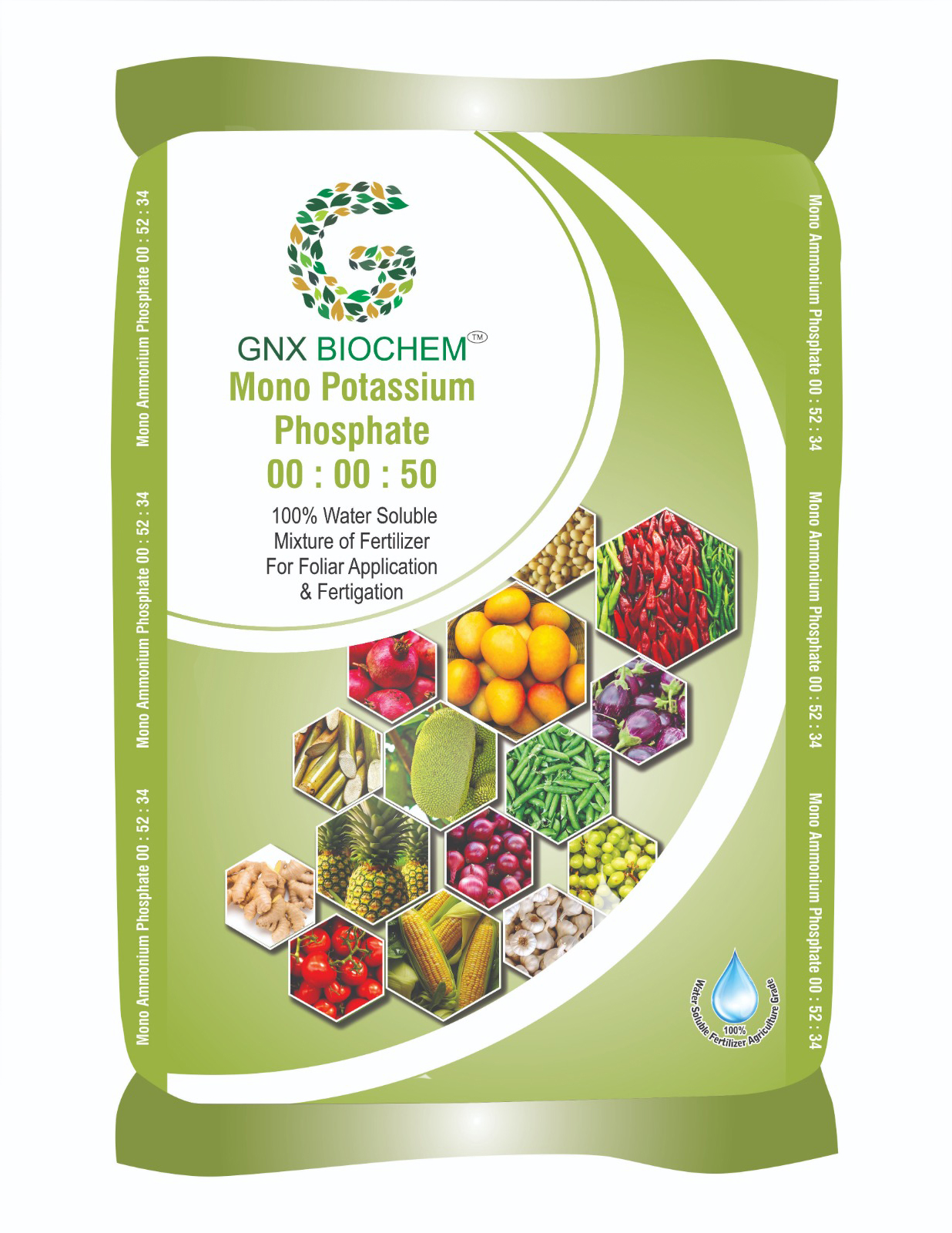Specifications
- Chemical Composition:
Mono Potassium Phosphate has the chemical formula KH₂PO₄. It typically
contains about 22% potassium (K₂O) and 28% phosphorus (P₂O₅).
- Form:
MKP is available in a crystalline or granular form, which dissolves readily
in water, making it suitable for fertigation (applying fertilizers through
irrigation systems) and foliar applications.
- Texture:
The texture of MKP is fine and powdery or granular, allowing for easy
dissolution and uniform application.
- Moisture Content:
MKP has a low moisture content and is highly stable, minimizing the risk
of clumping or caking.
- pH Level:
When dissolved in water, MKP typically has a pH of around 4.0 to 5.0,
making it slightly acidic. This helps in maintaining nutrient availability
in various soil types.
Benefits
- Balanced Nutrient Supply: Provides both potassium and phosphorus in a single
formulation, supporting multiple aspects of plant growth. Potassium aids
in water regulation, enzyme activation, and stress resistance, while
phosphorus supports root development, energy transfer, and flowering.
- Enhanced Nutrient Availability: MKP is highly soluble in water, which ensures that the
nutrients are readily available to plants. This is particularly beneficial
for fertigation systems and foliar feeding.
- Improved Plant Health: Enhances overall plant health by promoting strong root
systems, better flowering, and increased fruit and seed development.
Potassium also improves plant resistance to diseases and environmental
stress.
- Increased Crop Yields: By providing essential nutrients in a readily
available form, MKP helps to boost crop yields and improve the quality of
harvested produce.
- Efficient Nutrient Uptake: Reduces nutrient leaching and runoff compared to some
other fertilizers, ensuring that nutrients are utilized effectively by the
plants.
- Versatile Application: Suitable for a wide range of crops and growing
conditions, including vegetables, fruits, flowers, and ornamental plants.
Dose
- General Application:
The application rate of MKP varies based on soil test results, crop
requirements, and specific growing conditions. A typical recommendation is
to apply 10-20 kg of MKP per hectare for general crop fertilization.
Adjustments may be necessary based on soil and plant needs.
- Fertigation:
For fertigation systems, use 1-2 kg of MKP per 1,000 liters of irrigation
water. The solution should be applied regularly throughout the growing
season, based on the crop's nutrient needs.
- Foliar Application:
For foliar feeding, dissolve 5-10 grams of MKP per liter of water. Apply
the solution to the plant leaves, preferably in the early morning or late
afternoon to avoid leaf burn and maximize nutrient uptake.
- Vegetable and Flower Gardens: Use approximately 1-2 pounds of MKP per 100 square
feet of garden area. Mix it into the soil before planting or apply it as a
side dressing during the growing season.
- Fruit Trees:
Apply 2-4 pounds of MKP per tree, spreading it evenly around the root
zone. Incorporate into the soil if possible.
- Potted Plants:
Mix 1-2 tablespoons of MKP into each gallon of potting soil before
planting. For top-dressing, apply a small amount evenly around the base of
the plant.
- Lawns:
Apply 1-2 pounds of MKP per 1,000 square feet of lawn area. This can be
applied in early spring or late summer for best results.
In summary, Mono Potassium Phosphate
(MKP) is a highly effective and versatile fertilizer that provides essential
potassium and phosphorus to support plant growth and development. Its high
solubility ensures that nutrients are readily available, making it suitable for
various application methods, including fertigation and foliar feeding. By
following the recommended dosages and application guidelines, users can
effectively enhance soil fertility and improve plant health and productivity.
